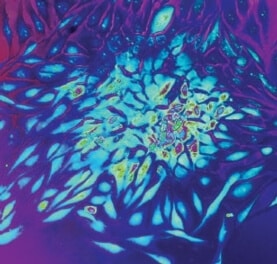A common product of cholesterol breakdown may stimulate the growth of breast cancer

For a long time, researchers have been trying to understand why women who are at risk of heart disease are more prone than others to develop breast cancer. Recently it was found in a study that a high level of cholesterol may play an important role in the development of the disease.
Estrogen is the driving factor of most breast cancers in women. The hormone binds to certain proteins within the tumor that act as receptors and stimulates its development. Therefore, when Philip Shaul, a pediatrician and biologist at Southwestern Medical Center at the University of Texas, and his colleagues discovered that one of the common breakdown products of cholesterol also activates the estrogen receptors, they realized that they had discovered something important. In collaboration with Donald McDonnell, a cancer biologist at Duke University, they showed in 2008 that the breakdown product of cholesterol, known as 27HC, accelerates the growth of breast cancer cells in humans.
Building on their previous work, Saul and McDonnell showed in separate studies, the results of which were published in November 2013 in the journals Cell Report and Science, respectively, that 27HC accelerates cancer development in mice with human estrogen receptors. In the samples he took from patients at the hospital where he worked, Shaul found that the levels of 27HC in healthy breast tissue of women with breast cancer were three times higher than its level in healthy women. In the tumor cells itself, its level was 2.3 times higher. He also found lower recovery rates in cancer patients who have a low level of the 27HC breaking down enzyme in their body. When McDonnell's team fed mice a high-cholesterol or high-fat diet, their chances of developing breast cancer were higher than those of mice fed a normal diet. The two papers "put 27HC at the center of breast cancer research," says Sergio Dias, a biologist at the Institute of Molecular Medicine in Lisbon.
However, since Shaul did not find a consistent relationship between blood cholesterol levels and 27HC levels in human tumors, it is still unclear how blood cholesterol levels affect the risk of breast cancer. "There may be subgroups of women with high cholesterol who are at higher risk," he says.
The findings may have important implications for cancer treatment. They support the idea, already supported by one study, that drugs from the statin family, which lower the level of cholesterol in the blood, may slow the progression of some types of breast cancer. And since between 30% and 65% of women with breast cancer caused by estrogen do not respond to drugs that prevent the creation of estrogen, the studies suggest that some of them simply have a completely different cause of cancer," says Shaul.
The article was published with the permission of Scientific American Israel

2 תגובות
her daughter
Scientific-American is not an advertising newspaper. Where did you see an advertisement here?
Another advertising article. After some doctors came out against the cholesterol-lowering drugs, the manufacturers of the drug are looking for another target audience. Lo and behold, they discovered a problem in women with high cholesterol. A problem that proper nutrition can easily solve. And by the way, even according to the article, nothing is clear yet.